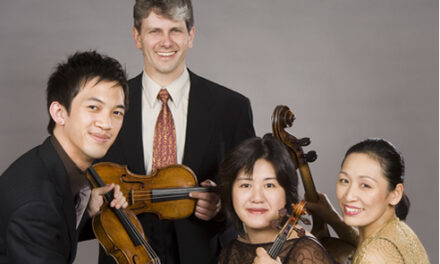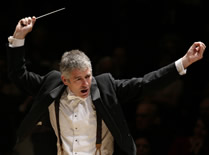Nowadays it’s considered crass to mention the attire of artists — any artists. But when the hotshot young pianist Stewart Goodyear showed up in Guilford College’s Dana Auditorium wearing a white tail-coat while conductor Robert Moody had on a black rehearsal shirt, open at the neck, and his charges, members of the all-student Festival Orchestra, were likewise outfitted for a warm night as opposed to fashion…, well, it took my breath away. And it also put me in the mind of that 50-year-old Marty Robbins song about “a white sport-coat and a pink carnation….” And while we’re at it, when was the last time you saw a white tail-coat?
Anyway, Goodyear has been making the rounds of late and garnering accolades everywhere. In Greensboro, he wrapped up the Eastern Music Festival‘s mini-Beethoven cycle with the “Emperor” Concerto — the other four works for keyboard and orchestra were heard on June 30 and on June 23.* The performance was remarkable in several respects. Technically, Goodyear gave a well-nigh flawless performance, even taking into account the rapid pace of the opening and closing movements — they flew, but there were no signs of stress on the soloist’s part and few if any perceptible signs of anxiety on the parts of the orchestra members. That said, the slow movement was a thing of exceptionally reflective beauty, so Goodyear was able to demonstrate his innate musicianship as well as his virtuoso chops. The scaled-down Festival Orchestra strutted its stuff, and Moody was comparably impressive, leading the whole she-bang watchfully. He worked without a baton, cuing the players and eliciting some wonderfully incisive playing, tending attacks and cutoffs with comparable gusto. The ovation at the end was richly deserved by all, and Goodyear got a bouquet, which I suppose sort of made up for that missing pink carnation mentioned above….
This EMF concert began with a stage-full of instrumentalists playing “Medea’s Meditation and Dance of Vengeance,” one of Samuel Barber’s most dramatic and impressive scores. It starts with a brooding introduction (the “Meditation”) and then concludes with one of the most exciting series of orchestral explosions — the word “climaxes” doesn’t quite cover the necessary ground — in captivity. The orchestra sounded like a fully-professional band, thus giving their teachers in the Eastern Phil. a real run for their money. Only in a couple of places did one wonder about the execution, and in truth the shaping of those few phrases might have been more Moody’s doing than the players’.
The second work on the first half was an encore performance of Mason Bates’ Rusty Air in Carolina, a score premiered by Moody and the Winston-Salem Symphony last season and reviewed at that time by our colleague William Thomas Walker, to whose write-up I refer readers who want to know more about the piece itself. In brief, it’s a four-part score that uses recorded and manipulated sounds from nature (insects and the like) in tandem with the orchestra to evoke nostalgic reflections on the South. (The movement titles — “Nan’s Porch,” “Katydid Country,” “Southern Midnight,” and “Southern Dawn” — are not particularly site-specific; and, for the record, as we left the concert, we heard a great chorus of insects on the Guilford College grounds that could just as well have been the same crowd we’d heard in the hall.) Young Bates (b.1977) was on hand to introduce his work, and the rapport Moody shared with him and the music was evident in the brilliant performance, although I think the balance in favor of the recorded sound was misjudged in the opening section.
The first part of the program ended with a bravura reading of Dukas’ “The Sorcerer’s Apprentice,” a showpiece not too often heard live anymore but one worth revisiting. It figures, famously, in Fantasia, and for reasons perhaps clearer to children than geezer-critics it seems to be getting more than its share of air-play now that the last Harry Potter book has come out. One can read the book or hear the music, I suppose. For me, Dukas as played by the Festival Orchestra contained more than enough wizardry!
The EMF continues through July 28 and is definitely worth a trip from anywhere within North Carolina, for this is an exceptional festival by any and all standards. See our Triad calendar for details of remaining events.
*For music lovers who are from ’round here I cannot resist plugging three all-Beethoven concerts coming up in Chapel Hill, Durham, and Raleigh on September 7-9, when the world-famous (and in this case, it’s true!) Abegg Trio will perform all of the master’s works for piano trio. See our special chamber music page for details.












